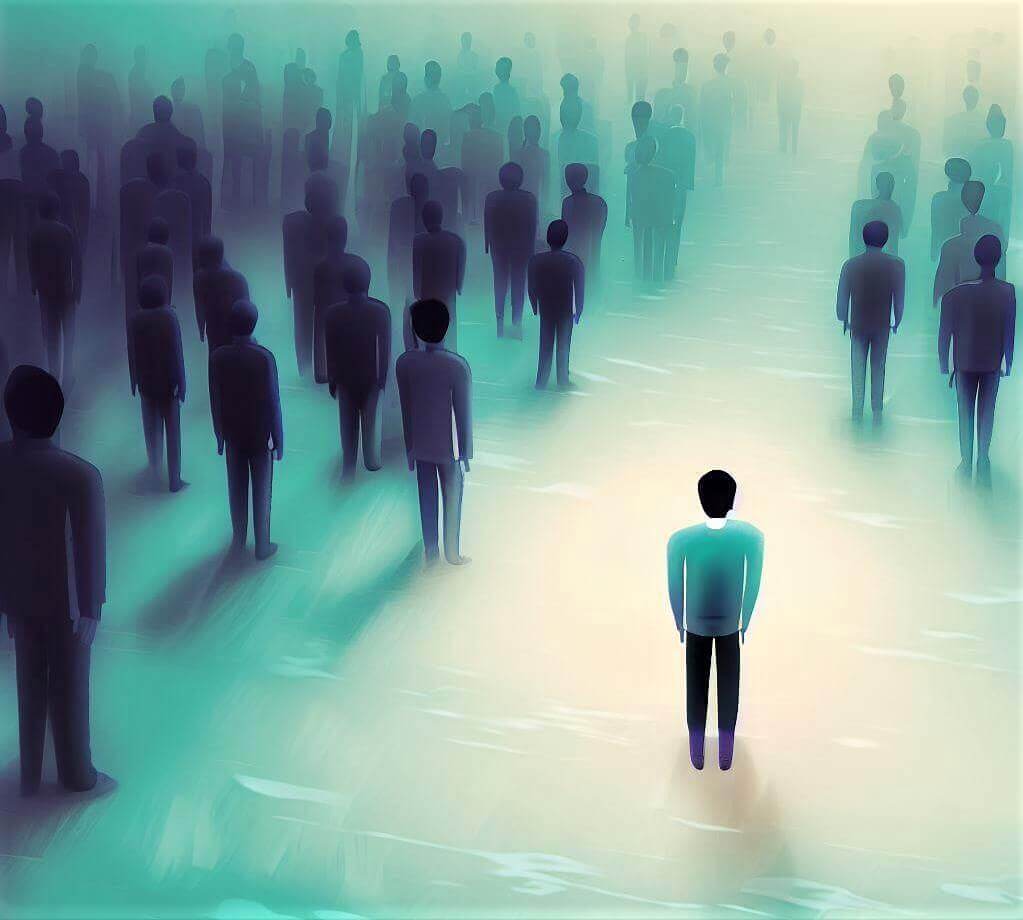In our modern era, we are more connected than ever before. Technology has made it easy for us to reach out and communicate with people from all over the world. This of course has numerous benefits- like the ability to stay in touch with family when living on the other side of the world, for example.
However this interconnectedness has not necessarily brought us closer together on a larger, big picture level. In fact, many of us feel more isolated and lonely than ever before.
According to some surveys, one third of the global population feels lonely, and among some age demographics the rates are as high as 80% who feel lonely and disconnected. Those are truly staggering statistics.
There are many reasons for the current loneliness issue, and I will cover them in more detail in future posts, but we can at least identify some common ones now:
- The digital space: An obvious one, but the majority of our interactions are now conducted digitally, which lacks the depth and richness of face-to-face communication.
- Lack of cultural/social unified cohesive structures: While in the past religion or other clearly defined social structures often gave people a cohesive set of unified principles to live their lives around, and a shared set of community pillars to support them, most people are now in fragmented groups, or completely alone. The sense of community no longer exists.
- Hyper-individualism without context: With the age of individualism came many advances that have benefited us in so many ways, and with the increase also came responsibilities to the freedom of choice we have in the modern world and the possibilities they entail. This can be a burden to some and our society may not have constructive ways to help individuals cope with this aspect.
All of these and more have now contributed to a trend known as atomization, which has significant implications for our sense of self and our relationships with others.
Atomization in this article refers to a condition where individuals become increasingly isolated and disconnected from one another, leading to a breakdown of social bonds and community ties.
The problem is not a recent one, and has been growing for several hundred years, coming to the forefront once again in the last few decades, and especially in recent years.
The Problem with Asymmetric Relationships
A prime example of atomization is the rise of asymmetric relationships, which are one sided relationships. One example is content consumption like podcasts, self-help books, and public lectures. When we engage in these activities, we enter into a one-sided relationship. The content creator does not know us, cannot respond to us, and does not consider our unique circumstances.
The same can be seen for so many online relationships- a fan of a movie star or influencer knows everything about the person, what they eat, what they drink, how and when they exercise, what they read, and even what they occasionally think, but the influencer or movie star knows nothing about the fan. The fan is merely a distant observer, consuming information without forming a real relationship.
This relationship is impersonal, and it positions us as passive consumers of information rather than active participants in a conversation. While these activities can provide valuable insights, like in the case of knowledge building podcasts for example, they can also lead to feelings of isolation and disconnection.

The Limitations of Artificial Connections
Consider another common scenario: attending a networking event. These events are designed to foster connections, but often, they feel artificial and impersonal. You might exchange business cards with numerous people, but these interactions rarely lead to deep, meaningful relationships.
Instead, they resemble a performance, where each party plays a role but fails to truly connect with the other. Such interactions are akin to the barista at a coffee shop calling out your name when your order is ready.
When a barista at a certain ‘popular coffee chain’ calls out your name, it gives a sense of familiarity and connection. But this interaction, while pleasant, is more of a simulation of personal connection than the real thing. It’s designed to mimic the feeling of being at a local cafe where the staff genuinely knows you.
We can also consider how many of us mistakenly believe that by gaining impersonal knowledge about others, we will rebuild bonds. This is akin to trying to reconnect with an old friend by reading their social media posts instead of actually talking to them. While you might discover their latest favourite restaurant or holiday destination, this impersonal knowledge doesn’t rekindle the bond you once shared.
It feels personal on the surface, but underneath, it’s a scripted interaction that lacks genuine connection.

The Path to Genuine Connection
To forge true connections, we must be willing to take risks. This might mean opening up to others, being vulnerable, and sharing our genuine selves. It’s not an easy task, and there’s no guarantee of success.
Yet, it’s precisely these risks that make genuine connections so rewarding. Unlike the illusion of connection offered by impersonal knowledge or artificial settings, real connection requires us to step out of our comfort zone.
These risks are integral to the process of forming authentic relationships. Avoiding these risks and seeking guaranteed, formulaic solutions only serves to reinforce our atomization.
For instance, we may tune into podcasts, attend webinars, read books, or follow influencers online. These interactions, while informative, often lack the mutual engagement that fosters genuine connection.
One characteristic of individuals in an atomized state is inaction, often stemming from a deep-seated desire for security and a fear of uncertainty. This inaction hinders them from forming deeper connections based on commitment and loyalty—elements that require action and risk.
And on the opposite side there is also seeking out structured ‘consciousness building’ events as another characteristic. We want to set up the stage for deeper connections, and force the mechanisms to facilitate this, under the guise of ‘elevating our consciousness’ to a similar level as others. To be sure, we need ‘social events’, but the trouble lies when we rely on these exclusively and in the hope that they will alleviate our loneliness and atomization.
By seeking to know everything in advance, we end up stalling the very connections we yearn for. And so we end up isolated and lacking clear purpose.
This isolation and lack of purpose, often experienced by atomized individuals, has also been dubbed the ‘meaning crisis‘. Many people often turn to experts who promise formulaic solutions to their problems. The common thread of the modern world is one of easy-take-a-pill quick fixes and one size fits all approaches.
They lament: If only science had an answer to repairing the meaning crisis and fixing the atomization!
However, these one-size-fits-all solutions often fail to deliver lasting results because they overlook the individual’s unique circumstances and experiences. Furthermore, these expert-led solutions reinforce the atomized individual’s sense of separation, creating yet another asymmetric relationship but letting others take the responsibility and control for their circumstances
The worst example of a one size fits all fix can be seen in the collectivization of societies in half the world’s countries in the 20th century, leading to a futile attempt of reducing atomization (though they weren’t aware of atomization of course) which led to millions of deaths in its attempt of unified social order and community.
No, science and experts won’t fix the loneliness issue. We cannot force people to become de-atomized and un-lonely.
So what then, is the solution?

Acceptance and Navigation
The experience of atomization is a reality of our modern world, but it doesn’t have to define us. We can acknowledge it as one aspect of our experience, and then seek ways to navigate through it.
This might involve finding a balance between consuming content and actively participating in conversations, or between attending networking events and seeking out more intimate, personal interactions. A middle way approach, if you like.
Rather than resist or eliminate atomization, we should recognize it as a recurring theme in our lives. Instead of seeking a one-size-fits-all solution to the loneliness epidemic, we should strive to understand the experience of atomization better and navigate in and out of it effectively.
Moreover, we need to realise that atomization and genuine connection are not mutually exclusive. Understanding the atomized individual can help us build bridges between our isolated and connected selves.
Most importantly, we must remember that true connection cannot be achieved through a one-size-fits-all solution. Each of us is unique, and we must find our own path towards genuine connection and belonging.
We can start this today by better understanding ourselves. Not through some self help book or podcast, but by experiencing. The act of a deeper, meaningful conversation is one way. Let go of the superficial boundaries we have placed in modern society, take a risk, and stare up at the night sky with another person and wonder together.
So the next time the barista calls out your name and hands you your coffee, recognise it for what it is, but not for what it should limit you from experiencing- and ask them with genuine curiosity ‘how is life’?





